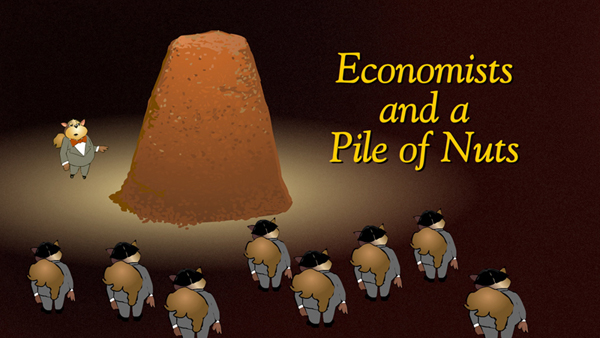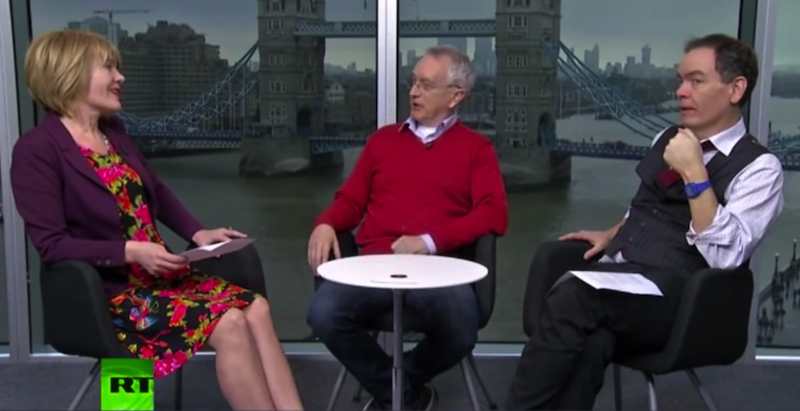My Experiences with Economists
essays / site map / view all movies / contact
“As a general rule economists are not very good at economics.
This is why almost none of them were able to recognize the $8 trillion housing bubble that sank the economy...
Most economists are unable to conceptualize anything that someone with more standing in the profession
did not already write about.”
Dean Baker PhD economist |
First the GOOD NEWS
One economist has been open to my analysis,
recommends my movies to all students of economics
and thinks my proposal is the...
OBVIOUS SOLUTION

There are also several very positive endorsements from economists on my Reviews Page.
I have heard from fans that they had seen my movie(s) at various universities, including the London and Koffi Annan Schools of Economics.
Several professors have told me they use my movies in their courses. One told me that Money as Debt saved him 3 months of teaching.
This article in the Guardian newspaper is recommended reading.
Its moral code promises salvation, its high priests uphold their orthodoxy. But perhaps too many of its doctrines are taken on faith.
The World Economics Association
I was invited by World Economics Association Editor, Merijn Knibbe, to submit a paper for peer review publication.
He was very helpful in instructing me how to prepare such a paper.
It was published and ignored by all except the people I notified.
Later, when the Editor asked "Do you think it's really that simple?"
I said "Yes". He said "Couldn't be" and I haven't heard from him since. Here's the paper.
Proposed new metric: the Perpetual Debt Level
The Editor had no refutation to offer. It was just "too simple" and therefore could not be true.
Just too EMBARRASINGLY SIMPLE is the truth of it.
How do economists admit to a shockingly fundamental incompetence
that has cost millions their homes, their livelihoods and in some cases, their lives?
OR, more cynically, is it the function of economists to act as "cover" for the banks?
There is a saying that goes...
"If a person's job depends on them NOT knowing something, you can be sure they don't know it".
Here is a cartoon that makes my case in 2 and 1/2 minutes.

Economists and a Pile of Nuts
I have posted my arguments to the WEA blog countless times since 2009.
I am ignored by the authors of the articles EVERY time and censored by the Editors quite often.
One would have to assume that|
ECONOMISTS DO NOT WANT TO LOOK TOO CLOSELY at the BANKING SYSTEM
Hypothesis Journal
Despite the very best efforts of the Editor who invited and coached me,
my submissions to Hypothesis Journal, a
science website.
were both rejected by economist reviewers.
(over 150 economics professors refused to even review them)
Mine would have been the first paper on money and economics for this journal.
My Analysis
The reasons given by the economist reviewers for NOT publishing my analysis.
• my theorem on why our money system is unstable is not novel
• my theorem fails to tie in with established theory and previously published papers.
The reason it doesn't tie in is because it is novel.
I haven't found any mention of the twice-lent money dynamic in almost 2 decades of reading monetary theory and economics.
One reviewer referred me to a supposed predecessor whose work didn't relate to my analysis at all.
His thesis didn't identify the structure of the banking system itself as the mathematical culprit.
Here's my submitted article: "Money hypothesis 1; why our money system is unstable".
Another criticism was that I back my simple logical arguments with references to primary sources
like the online publications of the Bank of England, the Bank of Canada, the Federal Reserve and the Bank for International Settlements.
The reviewers wanted references to academic papers about the money system,
not direct quotations from the BANKING RULEBOOK ITSELF!
In sports, if you want to know something about the game, do you consult the Rulebook
or ask for OPINIONS from people who have
NEVER READ the Rulebook?!!!!
One might suspect the real motivation was
to prevent the readers
from examining the banking system.
My Alternative
As for my alternative money proposal, one reviewer's objection was that
I needed to compare and contrast my ideas with every other similar system past and present.
That would have taken years and accomplished nothing. The basic idea has been in active use since writing and numbers were invented over 4,000 years ago and,
according to the highly instructive reference I did provide, currently accounts for at least 20% of world trade.

The other reason offered by one or more economists
for not publishing my proposal for change was that
"change would be required"!
I kid you not.
Here's my submitted article: "Money hypothesis 2; a different concept of money "
My "Debate" with Steve Keen and the Sovereign Money Movement
Sovereign Money Critique
In late 2014, I challenged the American Monetary Institute, Positive Money in the UK,
and a list of economists and money reformers, including "endogenous money" professor Steve Keen,
to refute my theorem according to the scientific method. The list included:
Steve Keen, Ben Dyson, Graham Hodgson, Elizabeth J Kucinich, Stephen Zarlenga, Joe Bongiovanni, Govert Schuller, Bernard Lietaer, Thomas Greco, Michael Linton,
Hazel Henderson, Catherine Austin Fitts, Peter Earl, Anne Belsey, Carl Herman, Mathias Binswanger, David Korten , Ellen Brown.
In science, proving a theorem is done by making every effort to disprove it.
The point of the challenge was to prove that their diagnosis is wrong.
I contend that a "sovereign money monopoly" would only make the situation worse.
I provided multiple proofs culminating in a new 5-page illustrated summation of my theorem.
How to Turn 9 Trillion Dollars of Unpayable Principal Debt into 9 Trillion Dollars of New Funding (PDF)
Almost all of the well-known monetary experts on the list HAD NOTHING TO SAY.
For several weeks, Keen and Bongiovanni (AMI) just stonewalled me with absurd misinterpretations and insults.
All that Keen could come up with in the end was a A CLEAR ADMISSION OF FAILURE.
| Keen: “when I have some spare time I’ll take on your misconceptions in a genuine mathematical critique of your silly arithmetic… the only question for me is whether I can be bothered wasting the time to prove you wrong. At the moment, the answer to that question is no. When it’s yes, I’ll write a blog post on the topic. Until then I can’t be bothered reading any more emails from you.” |

Keen on Max Keiser
KEEN'S "genuine mathematical critique" of my theorem
has been "promised" and NOT delivered
since I first challenged him to refute it in 2009
Nor is it likely to ever be forthcoming
• My facts are easily proven from the banking rulebook
and the graph of the money supply provided by the central bank itself.
• My logic is irrefutably simple
• My grade school arithmetic has been verified by a mathematics PhD
AVOIDING THE TRUTH IS THEIR ONLY OPTION
Economists and a Pile of Nuts 2:25
Here is my report:
Sovereign Money Critique
"I claim the so-called “sovereign money” monetary reform movements are all misguided. That is because they mistake the root of the problem for the remedy. They do this because of habitual educational and ideological blinders which result in a stubborn refusal to think through the logical repercussions of lending in a limited “money supply”, regardless of its source. Instead, like the professional economists whose abysmal track record bespeaks a fundamental incompetence, they resort to a magical fallacy I call “fuzzible money” that allows them to avoid calling into question the assumptions that form the foundations for their presumably well-meaning but provably futile reform proposals."
read the full article
essays / site map / view all movies / contact
|



